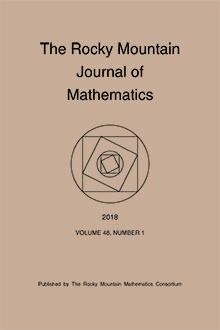Abstract
We prove the following sub- and super-additive properties of the psi function. \begin{enumerate} \item[(i)] The inequality \[ \psi\bigl( (x+y)^{\alpha} \bigr) \leq \psi(x^{\alpha})+\psi(y^{\alpha}) \quad{(\alpha \in\mathbf{R})} \] holds for all $x,y>0$ if and only if $\alpha\leq \alpha_0=-1.0266\ldots$\,. Here, $\alpha_0$ is given by \[ 2^{\alpha_0}=\inf_{t>0} \frac{\psi^{-1}\bigl( 2\psi(t) \bigr)}{t}=0.4908\ldots\, . \] \item[(ii)] The inequality \[ \psi(x^{\beta})+\psi(y^{\beta}) \leq \psi\bigl( (x+y)^{\beta} \bigr) \quad(\beta \in\mathbf{R}) \] is valid for all $x,y>0$ if and only if $\beta=0$. \end{enumerate}
Citation
Horst Alzer. "Sub- and super-additive properties of the psi function." Rocky Mountain J. Math. 44 (5) 1399 - 1414, 2014. https://doi.org/10.1216/RMJ-2014-44-5-1399
Information





